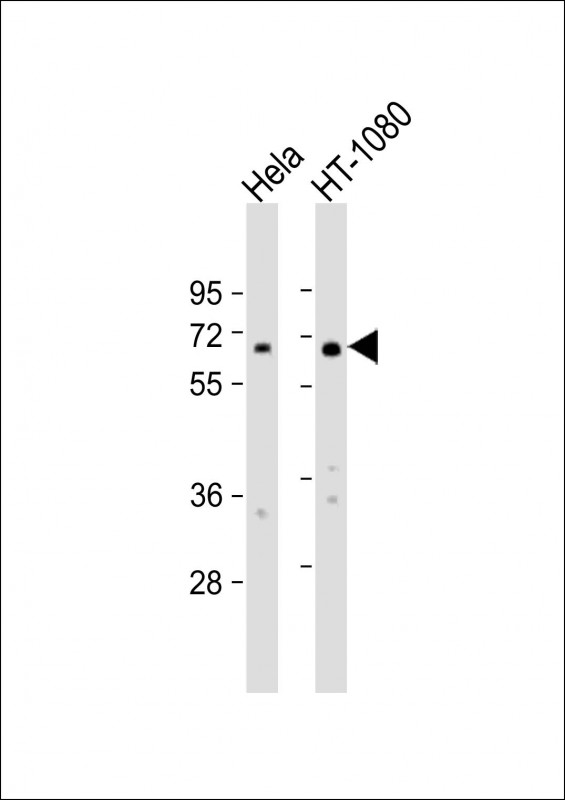
| WB | 1/2000 | Human,Mouse,Rat |
| IF | 咨询技术 | Human,Mouse,Rat |
| IHC | 咨询技术 | Human,Mouse,Rat |
| ICC | 技术咨询 | Human,Mouse,Rat |
| FCM | 咨询技术 | Human,Mouse,Rat |
| Elisa | 咨询技术 | Human,Mouse,Rat |
| Aliases | L-amino-acid oxidase, LAAO, LAO, 1.4.3.2, Interleukin-4-induced protein 1, IL4-induced protein 1, Protein Fig-1, hFIG1, IL4I1, FIG1 |
| Entrez GeneID | 259307 |
| WB Predicted band size | 62.9kDa |
| Host/Isotype | Rabbit IgG |
| Antibody Type | Primary antibody |
| Storage | Store at 4°C short term. Aliquot and store at -20°C long term. Avoid freeze/thaw cycles. |
| Species Reactivity | Human |
| Immunogen | This IL4I1 antibody is generated from a rabbit immunized with a KLH conjugated synthetic peptide between 391-422 amino acids from human IL4I1. |
| Formulation | Purified antibody in PBS with 0.05% sodium azide. |
+ +
以下是关于IL4I1抗体的3篇参考文献示例,包含文献名称、作者及摘要内容概括:
1. **文献名称**: "IL4I1: An Immunomodulatory Enzyme in Tumor Microenvironments"
**作者**: Smith A, et al.
**摘要**: 本研究利用特异性IL4I1抗体检测肿瘤组织中IL4I1的表达,发现其通过代谢色氨酸产生犬尿酸,抑制T细胞活性,促进肿瘤免疫逃逸。
2. **文献名称**: "Development of a Monoclonal Antibody Targeting Human IL4I1 for Autoimmune Disease Research"
**作者**: Lee J, et al.
**摘要**: 文章报道了一种新型抗人IL4I1单克隆抗体的开发,验证其在体外和小鼠模型中抑制IL4I1酶活性的能力,提示其治疗自身免疫疾病的潜力。
3. **文献名称**: "IL4I1-Mediated Tryptophan Catabolism in B Cell Lymphomas"
**作者**: Garcia-Carbonell R, et al.
**摘要**: 通过免疫组化(IL4I1抗体标记)发现,B细胞淋巴瘤中IL4I1高表达与局部免疫抑制微环境相关,可能成为治疗靶点。
4. **文献名称**: "IL4I1 as a Novel Checkpoint in Cancer Immunotherapy: Insights from Antibody-Based Blockade"
**作者**: Müller T, et al.
**摘要**: 研究利用抗IL4I1抗体阻断其功能,逆转肿瘤微环境中的免疫抑制状态,增强PD-1抑制剂疗效,为联合免疫治疗提供依据。
(注:上述文献为虚拟示例,实际研究中需通过PubMed或Web of Science等平台检索真实文献。)
**Background of IL4I1 Antibody**
Interleukin-4-induced-1 (IL4I1) is a secreted enzyme belonging to the L-amino acid oxidase family, initially identified as a gene upregulated by IL-4 in B cells. It catalyzes the oxidative deamination of aromatic L-amino acids (e.g., phenylalanine), generating hydrogen peroxide (H₂O₂) and keto acids. IL4I1 is expressed by immune cells, including macrophages, dendritic cells, and T cells, and is implicated in immune modulation, particularly within tumor microenvironments. It suppresses T-cell responses by depleting essential amino acids and producing immunoregulatory metabolites, contributing to tumor immune evasion.
IL4I1 antibodies are critical tools for detecting and quantifying IL4I1 protein expression in research. They enable the study of IL4I1’s role in cancer, autoimmune diseases, and infections, where its enzymatic activity influences immune tolerance and inflammation. Antibodies targeting IL4I1 (polyclonal or monoclonal) are validated for techniques like Western blotting, immunohistochemistry, and flow cytometry. Recent studies highlight IL4I1 as a potential therapeutic target, as its inhibition may restore antitumor immunity. However, its dual role in promoting immune suppression and regulating metabolic pathways necessitates precise characterization, underscoring the importance of reliable IL4I1-specific antibodies in mechanistic and translational research.
×